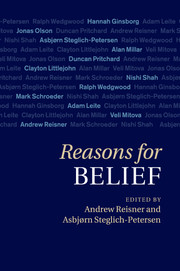Book contents
- Frontmatter
- Contents
- Contributors
- Preface
- Introduction
- PART I NORMATIVE REASONS FOR BELIEF
- PART II REASONS AND EPISTEMIC JUSTIFICATION
- 6 Reasons and belief's justification
- 7 Perception, generality, and reasons
- 8 Immediate warrant, epistemic responsibility, and Moorean dogmatism
- 9 Primitively rational belief-forming processes
- 10 What does it take to “have” a reason?
- 11 Knowledge and reasons for belief
- 12 What is the swamping problem?
- References
- Index
12 - What is the swamping problem?
Published online by Cambridge University Press: 05 July 2011
- Frontmatter
- Contents
- Contributors
- Preface
- Introduction
- PART I NORMATIVE REASONS FOR BELIEF
- PART II REASONS AND EPISTEMIC JUSTIFICATION
- 6 Reasons and belief's justification
- 7 Perception, generality, and reasons
- 8 Immediate warrant, epistemic responsibility, and Moorean dogmatism
- 9 Primitively rational belief-forming processes
- 10 What does it take to “have” a reason?
- 11 Knowledge and reasons for belief
- 12 What is the swamping problem?
- References
- Index
Summary
TRUTH, BELIEF AND EPISTEMIC VALUE T-MONISM
Most will agree that there is a constitutive relationship between belief and truth. Often, this relationship is expressed in terms of the slogan that belief in some sense ‘aims’ at the truth; that the telos of belief is truth. I think this slogan is essentially correct, though we need to be careful how we are understanding it. After all, since most beliefs are involuntarily formed, we do not want to be reading this slogan in such a way that it commits us to supposing that the agent forming the belief has some sort of occurent intention to form true beliefs whenever a belief is formed. Instead, I take it that what is meant by this claim is rather that what makes a belief the kind of propositional attitude that it is is that it is sensitive to considerations which indicate that the belief is either true or false. This is why one cannot self-consciously regard oneself as having overwhelming reason to think that a proposition is false and yet believe it nonetheless, for this would not then be a case of belief, but rather wishful thinking or something like that.
Given that belief has this aim, a primary way of evaluating beliefs is in terms of whether they achieve this aim: whether they are true. Relatedly, we will assess beliefs in terms of whether they are based on reasons which suggest the truth of the proposition believed.
Keywords
- Type
- Chapter
- Information
- Reasons for Belief , pp. 244 - 259Publisher: Cambridge University PressPrint publication year: 2011
- 24
- Cited by

